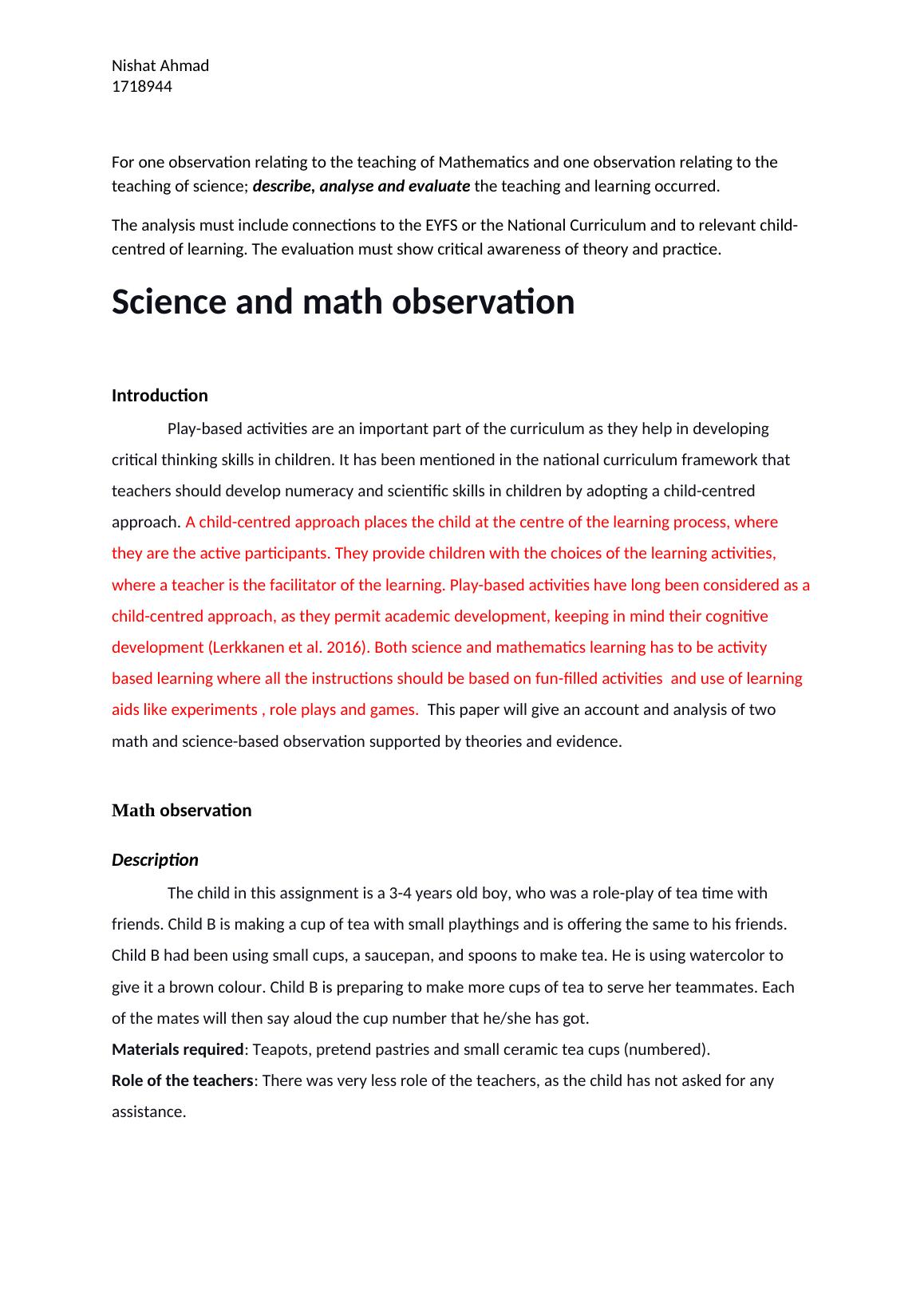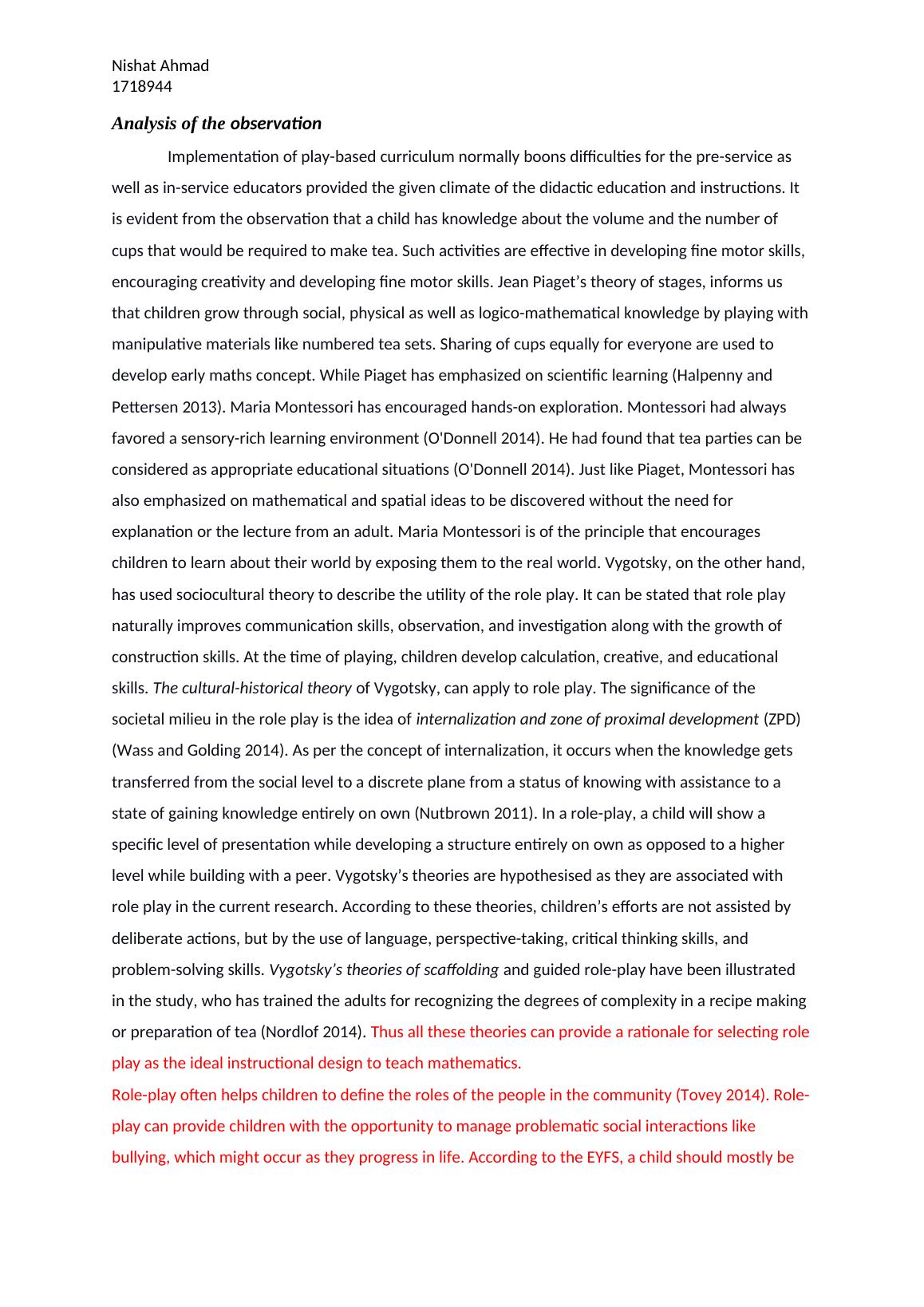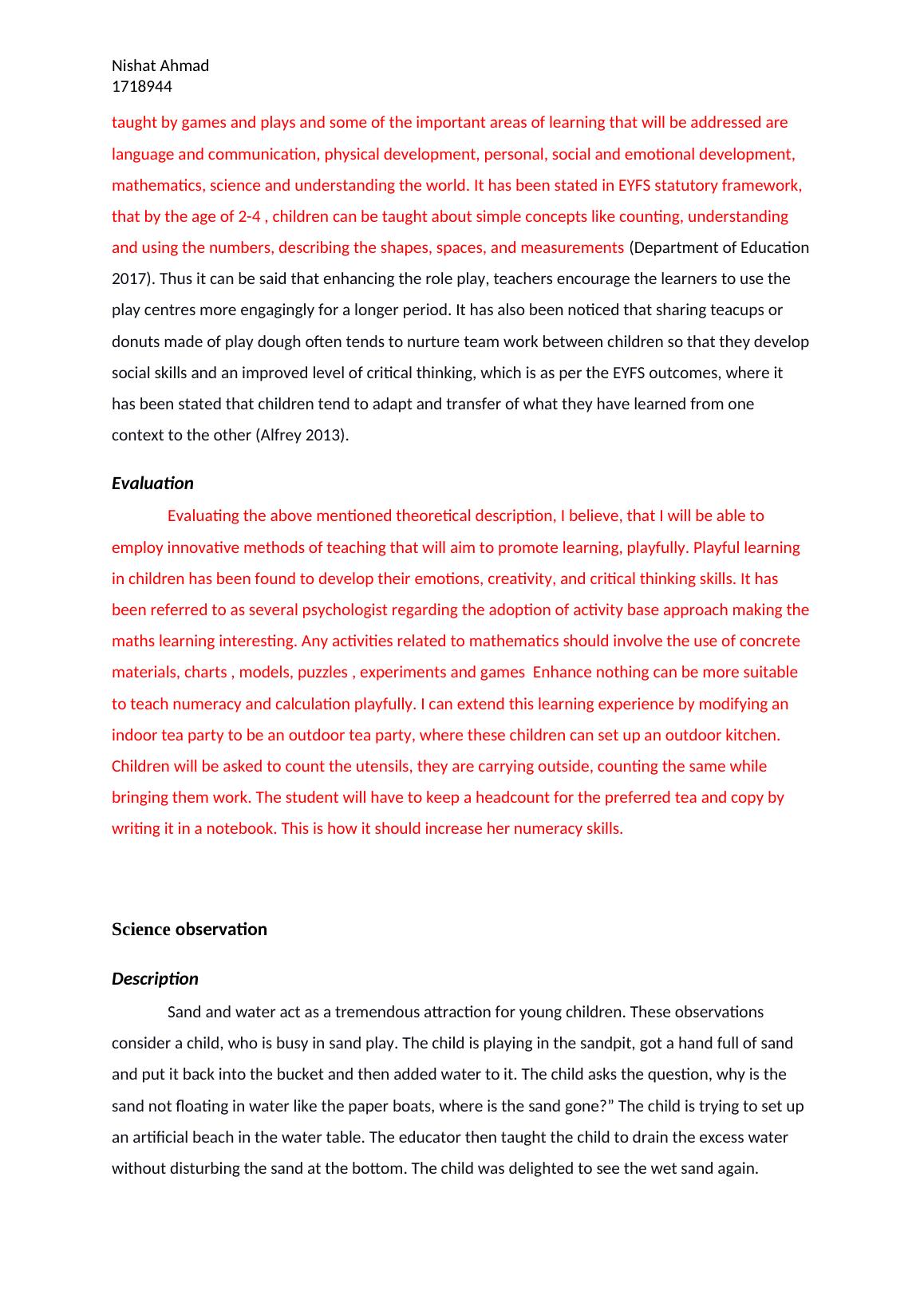National Curriculum Analysis 2022
Discuss and plan a child-centered learning environment focusing on mathematical or scientific learning. Analyze and evaluate teaching and learning in math and science observations.
7 Pages3002 Words33 Views
Added on 2022-08-31
National Curriculum Analysis 2022
Discuss and plan a child-centered learning environment focusing on mathematical or scientific learning. Analyze and evaluate teaching and learning in math and science observations.
Added on 2022-08-31
ShareRelated Documents
Nishat Ahmad
1718944
For one observation relating to the teaching of Mathematics and one observation
relating to the teaching of science;
describe, analyse and evaluate the
teaching and learning occurred.
The analysis must include connections to the EYFS or the National Curriculum
and to relevant child-centred of learning. The evaluation must show critical
awareness of theory and practice.
Science and math observation
Introduction
Play-based activities are an important part of the curriculum as they help
in developing critical thinking skills in children. It has been mentioned in the
national curriculum framework that teachers should develop numeracy and
scientific skills in children by adopting a child-centred approach. A child-centred
approach places the child at the centre of the learning process, where they are
the active participants. They provide children with the choices of the learning
activities, where a teacher is the facilitator of the learning. Play-based activities
have long been considered as a child-centred approach, as they permit academic
development, keeping in mind their cognitive development (Lerkkanen et al.
2016). Both science and mathematics learning has to be activity based learning
where all the instructions should be based on fun-filled activities and use of
learning aids like experiments , role plays and games. This paper will give an
account and analysis of two math and science-based observation supported by
theories and evidence.
Math observation
Description
The child in this assignment is a 3-4 years old boy, who was a role-play of
tea time with friends. Child B is making a cup of tea with small playthings and is
offering the same to his friends. Child B had been using small cups, a saucepan,
and spoons to make tea. He is using watercolor to give it a brown colour. Child B
is preparing to make more cups of tea to serve her teammates. Each of the
mates will then say aloud the cup number that he/she has got.
1718944
For one observation relating to the teaching of Mathematics and one observation
relating to the teaching of science;
describe, analyse and evaluate the
teaching and learning occurred.
The analysis must include connections to the EYFS or the National Curriculum
and to relevant child-centred of learning. The evaluation must show critical
awareness of theory and practice.
Science and math observation
Introduction
Play-based activities are an important part of the curriculum as they help
in developing critical thinking skills in children. It has been mentioned in the
national curriculum framework that teachers should develop numeracy and
scientific skills in children by adopting a child-centred approach. A child-centred
approach places the child at the centre of the learning process, where they are
the active participants. They provide children with the choices of the learning
activities, where a teacher is the facilitator of the learning. Play-based activities
have long been considered as a child-centred approach, as they permit academic
development, keeping in mind their cognitive development (Lerkkanen et al.
2016). Both science and mathematics learning has to be activity based learning
where all the instructions should be based on fun-filled activities and use of
learning aids like experiments , role plays and games. This paper will give an
account and analysis of two math and science-based observation supported by
theories and evidence.
Math observation
Description
The child in this assignment is a 3-4 years old boy, who was a role-play of
tea time with friends. Child B is making a cup of tea with small playthings and is
offering the same to his friends. Child B had been using small cups, a saucepan,
and spoons to make tea. He is using watercolor to give it a brown colour. Child B
is preparing to make more cups of tea to serve her teammates. Each of the
mates will then say aloud the cup number that he/she has got.

Nishat Ahmad
1718944
Materials required: Teapots, pretend pastries and small ceramic tea cups
(numbered).
Role of the teachers: There was very less role of the teachers, as the child has
not asked for any assistance.
Analysis of the
observation
Implementation of play-based curriculum normally boons difficulties for
the pre-service as well as in-service educators provided the given climate of the
didactic education and instructions. It is evident from the observation that a child
has knowledge about the volume and the number of cups that would be required
to make tea. Such activities are effective in developing fine motor skills,
encouraging creativity and developing fine motor skills. Jean Piaget’s theory of
stages, informs us that children grow through social, physical as well as logico-
mathematical knowledge by playing with manipulative materials like numbered
tea sets. Sharing of cups equally for everyone are used to develop early maths
concept. While Piaget has emphasized on scientific learning (Halpenny and
Pettersen 2013). Maria Montessori has encouraged hands-on exploration.
Montessori had always favored a sensory-rich learning environment (O'Donnell
2014). He had found that tea parties can be considered as appropriate
educational situations (O'Donnell 2014). Just like Piaget, Montessori has also
emphasized on mathematical and spatial ideas to be discovered without the
need for explanation or the lecture from an adult. Maria Montessori is of the
principle that encourages children to learn about their world by exposing them to
the real world. Vygotsky, on the other hand, has used sociocultural theory to
describe the utility of the role play. It can be stated that role play naturally
improves communication skills, observation, and investigation along with the
growth of construction skills. At the time of playing, children develop calculation,
creative, and educational skills.
The cultural-historical theory of Vygotsky, can
apply to role play. The significance of the societal milieu in the role play is the
idea of
internalization and zone of proximal development (ZPD) (Wass and
Golding 2014). As per the concept of internalization, it occurs when the
knowledge gets transferred from the social level to a discrete plane from a status
of knowing with assistance to a state of gaining knowledge entirely on own
(Nutbrown 2011). In a role-play, a child will show a specific level of presentation
while developing a structure entirely on own as opposed to a higher level while
building with a peer. Vygotsky’s theories are hypothesised as they are
associated with role play in the current research. According to these theories,
1718944
Materials required: Teapots, pretend pastries and small ceramic tea cups
(numbered).
Role of the teachers: There was very less role of the teachers, as the child has
not asked for any assistance.
Analysis of the
observation
Implementation of play-based curriculum normally boons difficulties for
the pre-service as well as in-service educators provided the given climate of the
didactic education and instructions. It is evident from the observation that a child
has knowledge about the volume and the number of cups that would be required
to make tea. Such activities are effective in developing fine motor skills,
encouraging creativity and developing fine motor skills. Jean Piaget’s theory of
stages, informs us that children grow through social, physical as well as logico-
mathematical knowledge by playing with manipulative materials like numbered
tea sets. Sharing of cups equally for everyone are used to develop early maths
concept. While Piaget has emphasized on scientific learning (Halpenny and
Pettersen 2013). Maria Montessori has encouraged hands-on exploration.
Montessori had always favored a sensory-rich learning environment (O'Donnell
2014). He had found that tea parties can be considered as appropriate
educational situations (O'Donnell 2014). Just like Piaget, Montessori has also
emphasized on mathematical and spatial ideas to be discovered without the
need for explanation or the lecture from an adult. Maria Montessori is of the
principle that encourages children to learn about their world by exposing them to
the real world. Vygotsky, on the other hand, has used sociocultural theory to
describe the utility of the role play. It can be stated that role play naturally
improves communication skills, observation, and investigation along with the
growth of construction skills. At the time of playing, children develop calculation,
creative, and educational skills.
The cultural-historical theory of Vygotsky, can
apply to role play. The significance of the societal milieu in the role play is the
idea of
internalization and zone of proximal development (ZPD) (Wass and
Golding 2014). As per the concept of internalization, it occurs when the
knowledge gets transferred from the social level to a discrete plane from a status
of knowing with assistance to a state of gaining knowledge entirely on own
(Nutbrown 2011). In a role-play, a child will show a specific level of presentation
while developing a structure entirely on own as opposed to a higher level while
building with a peer. Vygotsky’s theories are hypothesised as they are
associated with role play in the current research. According to these theories,

Nishat Ahmad
1718944
children’s efforts are not assisted by deliberate actions, but by the use of
language, perspective-taking, critical thinking skills, and problem-solving
skills.
Vygotsky’s theories of scaffolding and guided role-play have been
illustrated in the study, who has trained the adults for recognizing the degrees of
complexity in a recipe making or preparation of tea (Nordlof 2014). Thus all
these theories can provide a rationale for selecting role play as the ideal
instructional design to teach mathematics.
Role-play often helps children to define the roles of the people in the community
(Tovey 2014). Role-play can provide children with the opportunity to manage
problematic social interactions like bullying, which might occur as they progress
in life. According to the EYFS, a child should mostly be taught by games and
plays and some of the important areas of learning that will be addressed are
language and communication, physical development, personal, social and
emotional development, mathematics, science and understanding the world. It
has been stated in EYFS statutory framework, that by the age of 2-4 , children
can be taught about simple concepts like counting, understanding and using the
numbers, describing the shapes, spaces, and measurements (Department of
Education 2017). Thus it can be said that enhancing the role play, teachers
encourage the learners to use the play centres more engagingly for a longer
period. It has also been noticed that sharing teacups or donuts made of play
dough often tends to nurture team work between children so that they develop
social skills and an improved level of critical thinking, which is as per the EYFS
outcomes, where it has been stated that children tend to adapt and transfer of
what they have learned from one context to the other (Alfrey 2013).
Evaluation
Evaluating the above mentioned theoretical description, I believe, that I
will be able to employ innovative methods of teaching that will aim to promote
learning, playfully. Playful learning in children has been found to develop their
emotions, creativity, and critical thinking skills. It has been referred to as several
psychologist regarding the adoption of activity base approach making the maths
learning interesting. Any activities related to mathematics should involve the use
of concrete materials, charts , models, puzzles , experiments and games
Enhance nothing can be more suitable to teach numeracy and calculation
playfully. I can extend this learning experience by modifying an indoor tea party
to be an outdoor tea party, where these children can set up an outdoor kitchen.
Children will be asked to count the utensils, they are carrying outside, counting
1718944
children’s efforts are not assisted by deliberate actions, but by the use of
language, perspective-taking, critical thinking skills, and problem-solving
skills.
Vygotsky’s theories of scaffolding and guided role-play have been
illustrated in the study, who has trained the adults for recognizing the degrees of
complexity in a recipe making or preparation of tea (Nordlof 2014). Thus all
these theories can provide a rationale for selecting role play as the ideal
instructional design to teach mathematics.
Role-play often helps children to define the roles of the people in the community
(Tovey 2014). Role-play can provide children with the opportunity to manage
problematic social interactions like bullying, which might occur as they progress
in life. According to the EYFS, a child should mostly be taught by games and
plays and some of the important areas of learning that will be addressed are
language and communication, physical development, personal, social and
emotional development, mathematics, science and understanding the world. It
has been stated in EYFS statutory framework, that by the age of 2-4 , children
can be taught about simple concepts like counting, understanding and using the
numbers, describing the shapes, spaces, and measurements (Department of
Education 2017). Thus it can be said that enhancing the role play, teachers
encourage the learners to use the play centres more engagingly for a longer
period. It has also been noticed that sharing teacups or donuts made of play
dough often tends to nurture team work between children so that they develop
social skills and an improved level of critical thinking, which is as per the EYFS
outcomes, where it has been stated that children tend to adapt and transfer of
what they have learned from one context to the other (Alfrey 2013).
Evaluation
Evaluating the above mentioned theoretical description, I believe, that I
will be able to employ innovative methods of teaching that will aim to promote
learning, playfully. Playful learning in children has been found to develop their
emotions, creativity, and critical thinking skills. It has been referred to as several
psychologist regarding the adoption of activity base approach making the maths
learning interesting. Any activities related to mathematics should involve the use
of concrete materials, charts , models, puzzles , experiments and games
Enhance nothing can be more suitable to teach numeracy and calculation
playfully. I can extend this learning experience by modifying an indoor tea party
to be an outdoor tea party, where these children can set up an outdoor kitchen.
Children will be asked to count the utensils, they are carrying outside, counting

End of preview
Want to access all the pages? Upload your documents or become a member.
Related Documents
Water Play as a Tool for Learning: Exploring the Impact of Pedagogy on Maths and Sciencelg...
|15
|4281
|61
Key Theoretical Strategies of the Montessori Method of Education- Project Reportlg...
|8
|1400
|419
Early Childhood Curriculum Modelslg...
|12
|3709
|110
Montessori Education: Early Childhood Educational Approachlg...
|9
|1614
|68
Mathematics for Young Children (Doc)lg...
|17
|4930
|51
Bioliogy Assignment: Integrated STEM in Play-Based Learning Arealg...
|7
|1621
|20
